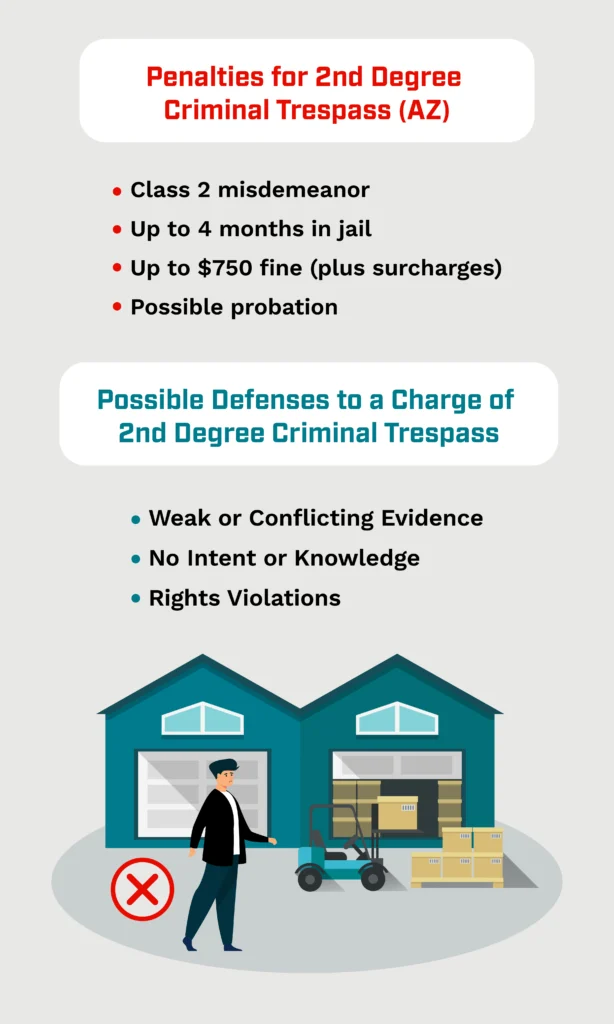
Posted on July 31, 2025 in Arizona Revised Statutes,Criminal Trespass
Arizona law recognizes three levels of criminal trespass, listed in order of severity: third degree, second degree, and first degree. This article focuses on second-degree criminal trespass.
Arizona Revised Statutes (ARS) 13-1503 defines second-degree criminal trespass and sets the penalty for its violation. The statute itself is brief; we lay it out in full below, with emphasis on some of its key terms.
13-1503. Criminal trespass in the second degree; classification
A. A person commits criminal trespass in the second degree by knowingly entering or remaining unlawfully in or on any nonresidential structure or in any fenced commercial yard.
B. Criminal trespass in the second degree is a class 2 misdemeanor.
Second-degree criminal trespass is narrowly defined. It can only happen in two kinds of places: fenced commercial yards and nonresidential structures. Therefore, it is important to clearly understand how Arizona law defines these spaces.
If you have been charged with criminal trespass in the second degree under ARS 13-1503, please call AZ Defenders at (480) 456-6400 immediately to get premium legal defense.
Knowingly entering or remaining unlawfully on property means that a person trespasses with an awareness that doing so is unlawful. It is intentional or purposeful behavior, not ignorant or inadvertent.
ARS 13-1501(b)(4) defines a fenced commercial yard as “a unit of real property that is surrounded completely by fences, walls, buildings or similar barriers, or any combination of fences, walls, buildings or similar barriers, and that is zoned for business operations or where livestock, produce or other commercial items are located.”
This basically means that if you cannot enter real property (land) without having to get past a physical barrier of some kind, like a fence, a wall, or a building, Arizona law considers that real property to be “fenced.”
To be a fenced commercial yard, the real property must also be a place where commercial or agricultural items are kept. This includes most kinds of storage yards used for business purposes.
ARS 13-1501(b)(10) defines a nonresidential structure as “any structure other than a residential structure and includes a retail establishment.”
The easiest and shortest way to define a nonresidential structure is to identify what it is not: a residence. Otherwise, nonresidential structures include a variety of “structures” as Arizona law defines that term under ARS 13-1501(12):
Examples of nonresidential structures include, but are not limited to:
Even a structure that is ultimately intended to be a residential structure, like an unfinished house that is not yet suitable for living in, can be considered a “nonresidential structure” until it is ready for habitation.
Under ARS 13-1501(b)(3), you do not have to use your whole body to be considered to have entered a nonresidential structure or a fenced commercial yard. Any of the following acts is a legal form of entry:
For example, it’s not a valid defense to claim you didn’t “enter” a vending machine because you can’t walk inside it if you forced it open with a crowbar. Similarly, reaching into a car with your arm rather than fully climbing in also still counts as entry under the law.
Criminal trespass in the second degree occurs as soon as a person enters the property. Unlike with third-degree criminal trespass, the property owner, property manager, or police officer does not need to demand that the person leave the property.
Second-degree criminal trespass charges often occur in combination with other criminal charges. For example, if the act of criminal trespass occurs in connection with a theft, one such additional charge can be burglary.
If the second-degree criminal trespass happens in combination with damage or defacement to property, then a criminal damage charge can be added.
A conviction for second-degree criminal trespass is a Class 2 misdemeanor under Arizona law. The penalties for a first offense Class 2 misdemeanor include any of the following:

The main defenses to trespassing charges generally, and to a second-degree criminal trespass, include the following forms.
As stated above, criminal trespass must be a knowing act. Proving that you believed you entered the property with the permission of the property owner could put reasonable doubt on the knowing element of the offense.
The lack of any “No Trespassing” signs on the property can also be persuasive evidence that you were unaware that you were trespassing. However, it is not conclusive, especially if other evidence exists that you intended to unlawfully enter (for example, you entered the property outside of business hours, or were wearing a mask to hide your identity).
The prosecution must prove that you were the person who committed the trespass. For example, if your arrest is based on video footage, casting reasonable doubt on the accuracy or reliability of that footage can serve as a valid defense.
Other ways you can challenge the evidence include showing forensic flaws with the way the police handled their evidence (chain of custody issues) or inaccuracies in police reports connected with your arrest and their investigation of you.
Also, introducing evidence, such as witness testimony that casts reasonable doubt on whether you were the one who committed the act of trespass, can also serve as a potential defense.
If the police fail to observe your constitutional rights under the United States and/or Arizona constitutions during your arrest and custodial interrogation for second-degree criminal trespass charges, the evidence gathered against you may become inadmissible in court or even lead to a dismissal of the charges against you.
These constitutional violations can include:
If you are charged with criminal trespass, having an experienced criminal defense lawyer on your side could be to your advantage. Being convicted of second-degree trespass can cost you your freedom, saddle you with a fine, put you on probation, and leave a blemish on your public record.
The criminal defense attorneys at AZ Defenders have a comprehensive understanding of Arizona’s criminal trespass laws and can give you the strongest legal representation when you are facing criminal trespass charges.
We know how to gather all the available relevant evidence to support your side of the story, including photographs of the real property where the alleged offense happened, obtain statements from any witnesses who were present, and look for any inconsistencies or weaknesses in the prosecution’s case against you.
To speak with an experienced Arizona-certified criminal defense specialist, call us anytime, day or night, at (480) 456-6400 or use our contact form.